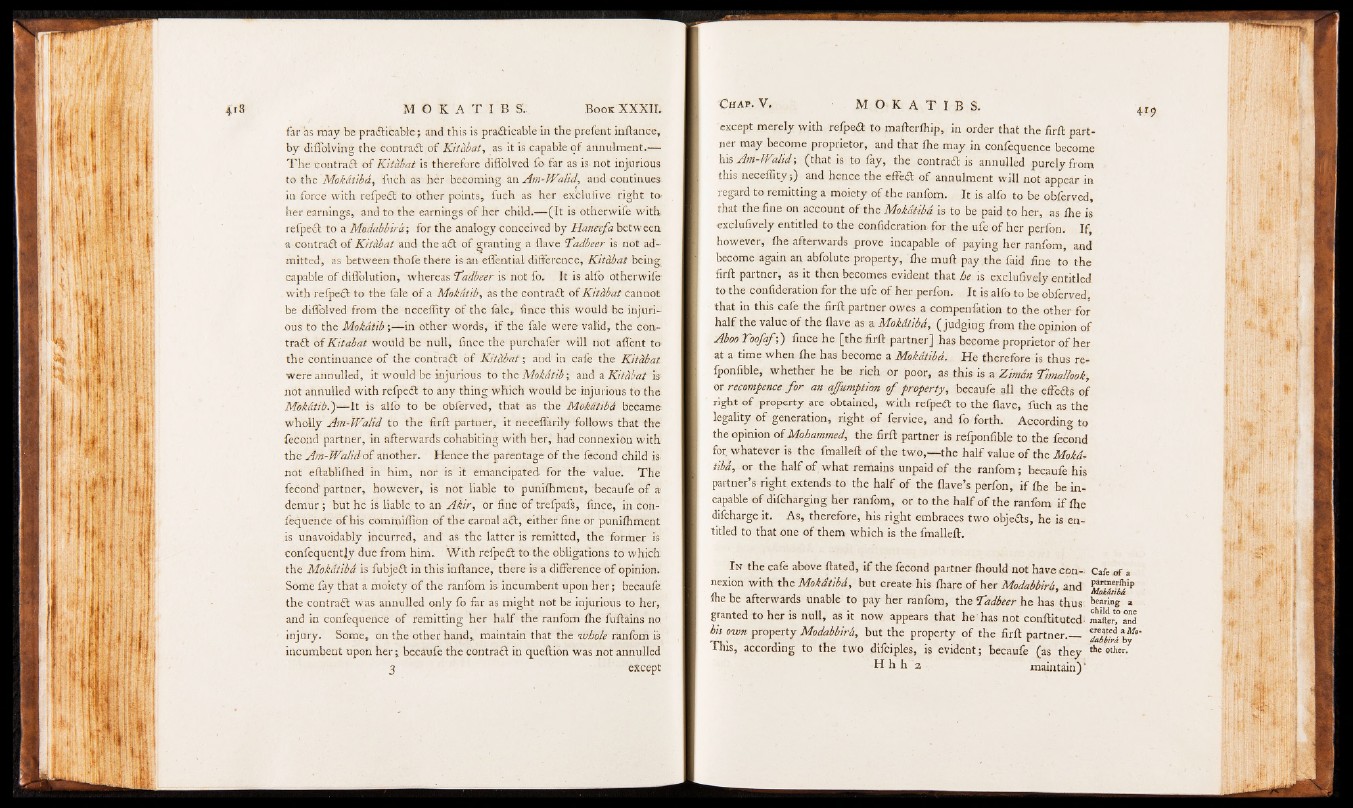
far as may be practicable ; and this is practicable in the prefent inftance,
by diffolving the Contraft of Kitabat, as it is capable of annulment.—
T h e contract of Kitïibat is therefore diffolved fo far as is not injurious
to the Mokdtiba, fuch as her becoming an Am-Walid, and continues,
in force with refpeft to other points, fuch as her exfclufive right toiler
earnings, and to the earnings of her child.— (It is otherwife with
refpeft to a Modabbirh', for the analogy conceived by Hanecfa between
a contract of Kitdbat and the aCt of granting a {lave Tadbeer is not admitted,
as between thofe there is an effential difference, Kitdbat being;
capable of diflolution, whereas fadbeer is not fo. It is alfo otherwife
with refpeCt to thé fale of a Mokdtib, as the contraCt of Kitabat cannot
be diffolved from the neceffity of the fale,. fince this would he injurious
to the Mokdtib ;— in other word's, if the fale were valid, the contract
of Kitabat would be null, fince the purchafer will not afïènt to-
the continuance o f the contract of Kitdbat; and in cafe the Kitdbat
were annulled, it would be injurious to the Mokdtib; avx& a Kitdbat is
not annulled with refpedt to any thing which would be injurious to the
Mokdtib.')— It is alfo to be obferved, that as the Mokdtiba became
wholly Am-Walid to the firft partner, it neceffarily follows that the
fecond partner, in afterwards cohabiting with her, had connexion with
the Am-Walid o f another. Hence the parentage of the fecond child is.
not ellablifhed in him, nor is it emancipated for the value. The
feconcf partner, however, is not liable to punifhment, becaufe of a-
demur; but he is liable to an A kir, or fine of trefpafs, fince, in. con-
fequende of his comrniffion of the carnal aft, either fine or punifhment
is unavoidably incurred, and as the latter is remitted, the former is
confequentjy due from him.. With refpeft to the obligations to which
the Mokdtiba is fubjeft in this inftance, there is a difference of opinion.
Some fay that a moiety of the ranfom is incumbent upon her; becaufe.
the contraft was annulled only fo far as might not be injurious to her,
and in confequénCë of remitting her half the ranfom fhe fuflains no.
injury. Some, on the other hand,, maintain that the whole ranfom is
incumbent upon her; becaufe the contraft in queflion was not annulled
3 except
except merely with refpeft to mafterfhip, in order that the firft partner
may become proprietor, and that fhe may in confequence become
his Am-Walid; (that is to fay, the contraft is annulled purely from
this neceffity;) and hence the effeft o f annulment will not appear in
regard to remitting a moiety of the ranfom. It is alfo to be obferved,
that the fine on account of the Mokdtiba is to be paid to her, as fhe is
exclufively entitled to the confideration for the ufe of her perfon. If,
however, fhe afterwards prove incapable of paying her ranfom, and
become again an abfolute property, fhe muff paythe faid fine to the
firft partner, as it then becomes evident that he is exclufively entitled
to the confideration for the ufe of her perfon. It is alfo to be obferved,
that in this cafe the firft partner owes a compenfation to the other for
half the value of the Have as a Mokdtiba, (judging from the opinion of
Aboo Toofaf;) fince he [the firft partner] has become proprietor o f her
at a time when fhe ha3 become a Mokdtiba. He therefore is thus re-
fponfible, whether he be rich or poor, as this is a /diman I ’imallook,
or recommence fo r an ajfumption o f property, becaufe all the effefts of
right of property are obtained, with refpeft to the flave, fuch as the
legality of generation, right of fervice, and fo forth. According to
the opinion of Mohammed, the firft partner is refponfible to the fecond
for. whatever is the fmalleft o f the two,— the half value of the Mokdtiba,
or the half o f what remains unpaid of the ranfom; becaufe his
partner’s right extends to the half of the flave’s perfon, i f fhe be incapable
of difcharging her ranfom, or to the half o f the ranfom i f fhe
difcharge it. As, therefore, his right embraces two objefts, he is entitled
to that one of them which is the fmalleft.
I n the cafe above ftated, if the fecond partner fliould not have con- Cafe o f a
nexion with the Mokdtiba, but create his fhare o f her Modabbira, and tu n in '9
fee be afterwards unable to pay her ranfom, the Tadbeer he has thus bearing a
granted to her is null, as it now appears that he has not conftituted. m £ ,° ™d
bis own property Modabbira, but the property of the firft partner cfe?,ted
T’k' j* i t . . r • dabbira by
■ tins, according to the two difciples, is evident; becaufe (as they ether.
H h h a maintain)‘